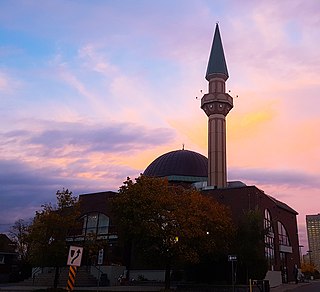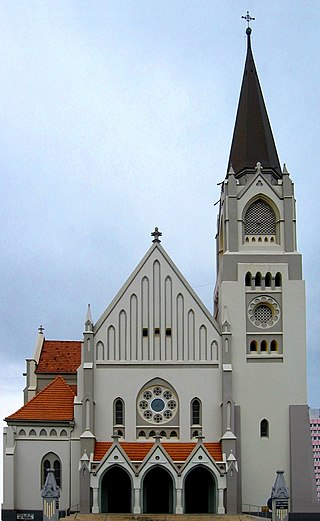Related Research Articles
The persecution of Muslims has been recorded throughout the history of Islam, beginning with its founding by Muhammad in the 7th century.

Islam is a minority religion in Canada. Muslims have lived in Canada since 1871 and the first mosque was established in 1938. Most Canadian Muslims are Sunni, while a significant minority are Shia and Ahmadiyya. There are a number of Islamic organizations and seminaries (madrasas). Opinion polls show most Muslims feel "very proud" to be Canadians, and majority are religious and attend mosque at least once a week. The majority of Canadian Muslims live in the provinces of Ontario and Quebec.

Islam's significance in Germany has largely increased after the labour migration in the 1960s and several waves of political refugees since the 1970s.

Although Islam is a minority religion in Russia, Russia has the largest Muslim population in Europe. According to US Department of State in 2017, Muslims in Russia numbered 14 million or roughly 10% of the total population. According to a comprehensive survey conducted in 2012, Muslims were 6.5% of Russia's population. However, the populations of two federal subjects with Islamic majorities were not surveyed due to social unrest, which together had a population of nearly 2 million, namely Chechnya and Ingushetia, thus the total number of Muslims may be slightly larger. The Grand Mufti of Russia, Sheikh Rawil Gaynetdin, places the Muslim population of Russia at 25 million as of 2018.

Islam is the most widespread religion in Bosnia and Herzegovina. It was introduced to the local population in the 15th and 16th centuries as a result of the Ottoman conquest of Bosnia and Herzegovina.
Pakistan has various religious minorities. According to the 1941 census of India, there were 5.9 million non-Muslims in the territories that came to form Pakistan in 1947 (West Pakistan and East Pakistan. During and after Pakistan's independence in 1947, about 5 million Hindus and Sikhs emigrated to India, with Punjab alone accounting for migration of 3.9 million people. According to the 1951 census conducted by the Government of Pakistan, Pakistan had 1.6% Hindu population. In East Pakistan, the non-Muslims comprised 23.2% of the total population.
Cultural Muslims are non-practicing individuals who still identify with Islam due to family backgrounds, personal experiences, or the social and cultural environment in which they grew up.

Islam in Denmark, being the country's largest minority religion, plays a role in shaping its social and religious landscape. According to a 2020 analysis by Danish researcher Brian Arly Jacobsen, an estimated 256,000 people in Denmark — 4.4% of the population — were Muslim in January, 2020. The figure has been increasing for the last several decades due to multiple immigration waves involving economic migrants and asylum seekers. In 1980, an estimated 30,000 Muslims lived in Denmark, amounting to 0.6% of the population.

Islam is the second largest religion in Norway after Christianity. As of 2021, the number of Muslims living in Norway was 169,605. The majority of Muslims in Norway are Sunni, with a significant Shia minority. Fifty-five percent of Muslims in the country live in the counties of Oslo and Akershus. The vast majority have an immigrant background, with Norwegians of Pakistani descent being the most visible and well-known group.

Angola is a predominantly Christian country with Islam being a minority religion. As of 2014 census, there are 195,000 muslims in Angola, representing 1% of total population. Most Muslims in Angola are Sunni. They are generally foreign migrants from West Africa and the Middle East, although a few are local converts. There exist several Islamic organizations that run mosques, schools and community centers. The Association of the Development of Islam in Angola is the primary proselytizing organization. Muslim Angolans are represented by the Supreme Council of Angolan Muslims of Luanda. As of late 2013, the Angolan government does not legally recognize any Muslim organizations; as a result, mosques in the country have faced restrictions and many have been shut down by the government.

Islam is the second largest religion in Belgium after Christianity. The exact number of Muslims in Belgium is unknown but various sources estimate that 4.0% to 7.6% of the country's population adheres to Islam. The first registered presence of Islam in Belgium was in 1829, but most Belgian Muslims are first-, second-, or third-generation immigrants that arrived after the 1960s.

Islam is a minority religion in Botswana, a country dominated by Christians. Islam came to the country through Muslim immigrants from South Asia, who settled in the area during the British colonial rule. According to the 2001 census, there are around 5,000 Muslims in Botswana, which is less than 1 percent of the population. The relations between the different religious groups remain peaceful and friendly despite rising inter-religious tensions in the other parts of Africa.

Andorra is a Christian majority country, with Islam being a minority religion. According to the US Religious Freedom Report of 2006 there are about 2000 North Africans currently living in Andorra and they are the largest Muslim group in the country.

Islam is the largest religion in Turkey according to the state, with 99.8% of the population being initially registered by the state as a Muslim. As much as 85-90% of the population follows Sunni Islam. Most Turkish Sunni Muslims belong to the Hanafi school of jurisprudence. The remaining 0.2% are Christians or adherents of other officially recognised religions like Judaism. The official number of Muslims include people with no religion; converted people and anyone who is of a different religion from their Muslim parents, but has not applied for a change of their individual records. These records can be changed or even blanked out on the request of the citizen, by filing an e-Government application since May 2020, using a valid electronic signature to sign the electronic application. Any change in religion records additionally results in a new ID card being issued. Any change in religion record also leaves a permanent trail in the census record, however, record of change of religion is not accessible except for the citizen in question, next-of-kin of the citizen in question, the citizenship administration and courts.

The Ahmadiyya branch of Islam has been subject to various forms of religious persecution and discrimination since the movement's inception in 1889. The Ahmadiyya Muslim movement emerged from the Sunni tradition of Islam and its adherents believe in all the five pillars and articles of faith required of Muslims. Ahmadis are considered non-Muslims by many mainstream Muslims since they consider Mirza Ghulam Ahmad, the founder of the movement, to be the promised Mahdi and Messiah awaited by the Muslims.
Of the religions in Tunisia, Islam is the most prevalent. It is estimated that approximately 99% of Tunisia's inhabitants identify themselves as Muslims.

Christianity is the most widely professed religion in Tanzania, with a substantial Muslim minority. Smaller populations of Animists, practitioners of other faiths, and religiously unaffiliated people are also present.
Islam is both the official and majority religion in the United Arab Emirates, professed by approximately 76% of the population. The Al Nahyan and Al Maktoum ruling families adhere to Sunni Islam of Maliki school of jurisprudence. Many followers of the Hanbali school of Sunni Islam are found in Sharjah, Umm al-Quwain, Ras al-Khaimah and Ajman. Their followers include the Al Qasimi ruling family. Other religions represented in the country including Christianity, Hinduism, Buddhism, Judaism and Sikhism are practiced by non-nationals.

Islam is a minority religion in the Marshall Islands. All Muslims in the country belong to the minority Ahmadiyya sect. The Ahmadiyya mosque in Uliga, first constructed in 2012 in the Marshall Islands is the only mosque in Oceania's subregion of Micronesia. According to a 2009 report there were about 10 Muslims in the Marshall Islands, although more recent reports indicate about 150 believers in the country.

Islam in the Cook Islands is a small religious minority in the New Zealand dependency of the Cook Islands. It's not exactly clear how many Muslims there are in the Cook Islands, because the calculation of Muslims doesn't participate in the country census. However, it is estimated that about 0.06% of the islands' population of about 15000 is Muslim. There are no mosques in the Islands. It is unclear how Islam first appeared in the Cook Islands. One of the earliest Cook Islanders to convert to Islam is Tatiana Kautai. Islam is a small but growing religious minority in the Cook Islands.
References
- ↑ State of the World's Minorities and Indigenous Peoples 2014 - Case study: Tahiti: Islamophobia in French Polynesia
- ↑ "First mosque opens in French Polynesia". 16 October 2013. Retrieved 4 August 2017.
- ↑ "Opening of Muslim prayer room in Tahiti causes uproar". 17 October 2013. Retrieved 4 August 2017.